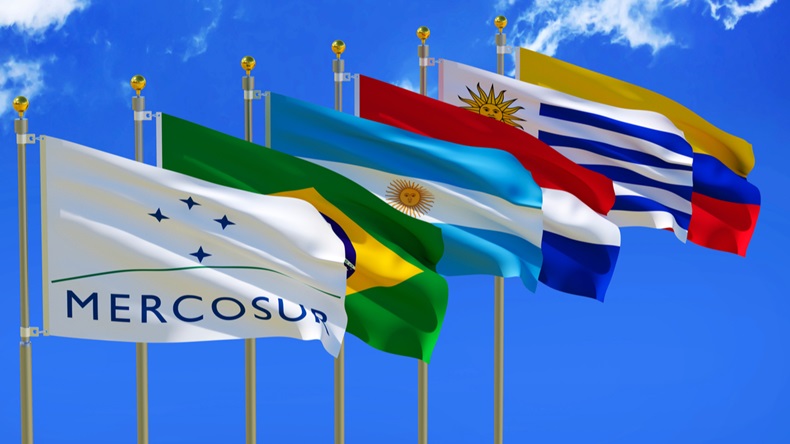RIO DE JANEIRO, BRAZIL – Foreign and economy ministers of MERCOSUR member countries failed on Wednesday (7) to reach a consensus on key trade policy issues of the bloc comprising Argentina, Brazil, Paraguay, and Uruguay, deepening the differences between the partners on the direction of the regional integration process.
In the run-up to the bloc’s semi-annual summit, the Common Market Council (CMC) meeting held online on Wednesday was disrupted when Uruguay announced to its members that it would begin to negotiate trade agreements with third countries outside the bloc.
Read also: Check out our coverage on Mercosur
Faced with the lack of progress in the signing of new major trade pacts, Montevideo was demanding a relaxation of MERCOSUR’s rules so that its members would be able to negotiate on their own and not as a single bloc.
But Argentina, which this semester has held the pro tempore presidency of the bloc, has resisted this proposal, claiming, among other common rules, the provisions of the Treaty of Asunción (1991), the bloc’s foundation agreement, which establishes “the adoption of a common trade policy in relation to third States or groupings of States.”
Without consensus among members, Uruguay reasserted in the CMC its “membership” in MERCOSUR as a full member. Still, it announced that it “will begin talks with third parties to negotiate trade agreements outside the zone,” as reported by the Uruguayan government in a communiqué.
Uruguay maintained that “inspired by principles of gradualness, flexibility, and balance, it will act in accordance with them in matters of international inclusion” and argued that, according to its interpretation, the bloc’s decision 32/00 “is not in force since it was never internalized.”
Decision 32/00, passed in June 2000 by the CMC, reaffirms “the commitment of MERCOSUR member states to jointly negotiate trade agreements with third countries or groupings of countries outside the zone in which tariff concessions are granted.”
ALSO NO AGREEMENT ON CET
According to official sources, the partners also failed to reach the required consensus to define a reduction of the common external tariff (CET), the review process of which began two years ago.
MERCOSUR’s CET stands at a maximum of 35%, but the average applied is 12%, higher than the global average of 5.5%.
While Uruguay and Brazil are promoting a substantial and broad tariff reduction, Argentina is proposing more moderate and selective reductions that do not affect domestic products that cannot compete with imports from other markets.
For its part, Paraguay said in a press release on Wednesday that “from the beginning it accompanied the CET review work, presenting options, to obtain a new, adjusted and more competitive CET, within a framework of a balance of interests.”
ENTREPRENEURS CONCERNED
The MERCOSUR Industrial Council, comprising the four largest industrial employers’ associations of the bloc’s countries, issued a statement on Wednesday that expressed the “concern” of entrepreneurs “given the possibility of adopting decisions that may have a great impact on the productive framework.”
Last month, in a joint statement, Argentine and Brazilian industrialists had already rejected a potential unilateral reduction of the CET. They demanded that “the obligation to act jointly” in external negotiations “to preserve and strengthen the negotiating capacity” of the region be maintained.
BEHIND CLOSED DOORS
After a semester of heated internal debates and even bombastic statements by the presidents of the bloc’s four full members, MERCOSUR reaches this Thursday’s summit in a tense atmosphere.
Argentine president Alberto Fernández will hand over the rotating presidency of the bloc to Brazilian Jair Bolsonaro. The presidential meeting will be held, for the fourth consecutive time, in virtual mode due to the Covid-19 pandemic.
But it will also be held behind closed doors, with no public broadcasting of the debates between the presidents, official sources confirmed.


